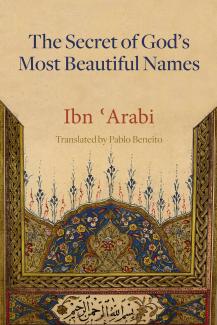
The Secret of God's Most Beautiful Names
Overview
‘Because He created us in His image, alone among all the forms in the world, and because not a single Name has come that we do not manifest and have ascribed to us – we contain Him.’ (Ibn ʿArabī, al-Futūḥāt al-Makkiyya)
The ‘naming’ of God is one of the essential pillars of the monotheistic traditions, and every Name of God has its own ‘presence’. According to ‘the greatest spiritual master’ Ibn ʿArabī (1165–1240), the 99 Names of God in Islamic devotional practice and spiritual teaching are the fundamental way of expressing the full relationship between the human being and the Divine. The Divine Names are thus the ways in which the One God bestows His beauty and beneficence upon the multiplicity of the created world, and on human beings in particular.
The Secret of God’s Most Beautiful Names presents, for the first time in English, two of the most profound teachings on the 99 Names: Ibn ʿArabī’s Kashf al-maʿnā, depicting each of the Names according to three complementary perspectives; and The Summary, drawn from his Futūḥāt al-Makkiyya. A comprehensive introduction and notes are provided alongside the translation and edition of the Arabic text.
This important classic of Sufi literature is a must-read for all who desire to understand the inner meaning of Islam and Ibn ʿArabī’s teachings.
Pablo Beneito, Professor at the Department of Translation and Interpreting, University of Murcia, Spain, is a well-known translator and commentator on Ibn ʿArabī, and editor of El Azufre Rojo: Revista de Estudios sobre Ibn Arabi.
Endorsements
It is a pleasure to welcome the English version of Pablo Beneito’s masterful bilingual edition of two of Ibn ʿArabī’s key works on the divine names: Kashf al-maʿnā, an early work and the “Summary,” a section from the Futūḥāt, from his Ibn ʿArabī’s later writing career. The English translation, based on both the Arabic text and Beneito’s Spanish translation, is lucid. The notes, crisp and carefully constructed, further our engagement with the sustained brilliance of these treatises. This book is an outstanding scholarly contribution to our understanding of Ibn ʿArabī’s teachings on the divine names and the divine-human relationship.
To appreciate the doctrine of the Most Beautiful Names of God in Islam and in the teachings of Shaykh al-Akbar, one must first note how their presence in the Qur'an constitutes the axial warp within which the carpet of existence, described in the Sacred text, is woven. The symbolism could not be clearer, and is related to the famous hadīth of the Hidden Treasure: it is the weft of existence that allows the manifestation of this warp of the divine Names. The synthesis between the two aspects forms the cosmic fabric, whose fullest expression appears in the 'Perfect Human Being' (al-insān al-kāmil). All this is perfectly reflected in the thought of Ibn ‘Arabi, who reserves a place of honour for the commentary on the divine Names in his magnum opus, where they form chap. 558 of the Futūhāt al-Makkiyya, and can be considered the conclusion of his doctrine.
Pablo Beneito's impeccable translation of the Kashf al-maʿnā ʿan sirr asmāʾ Allāh al-ḥusnā, followed by a summary of chap. 558, is therefore a major contribution to help us understand a profound aspect of Islamic metaphysics. Above all, it is intended to describe the interior dimension that the divine Names assume in spiritual realization. We can only welcome this English version, which revises and updates the previous versions, and can therefore be considered the definitive edition of this milestone in Akbarian studies.
This work by Pablo Beneito, to whom we also owe a debt for his several other valuable writings on Sufism, is an important addition to the study of Sufism in general and Ibn ‘Arabī in particular. It contains two precious works of the Andalusian master, edited and translated by Beneito with copious notes which are of much scholarly value. It is the Quran that speaks of God’s Beautiful Names (al-asmā’ al-husnā) and invites us to call upon Him by those Names. This Quranic verse is, therefore, one of the canonical sources for the central practice of Sufism, that is, the invocation of God’s Names (dhikr Allāh).
The present work is valuable for scholars especially interested in the practical dimension of Sufism and even more so for those who are walking on the Sufi Path or al-Tarīqah. The author must be congratulated for making such a work available in the English language. I hope and pray that this book is widely disseminated and receives the attention that it deserves.